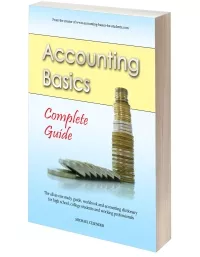The Definition of Assets in Accounting
Previous lesson: Basic Accounting Equation
Next lesson: Liabilities: Definition and Examples
In our previous lesson we were introduced to the basic accounting equation and its three elements: assets, liabilities and owners equity.
In this lesson we're going to learn the full definition of assets in accounting, when to recognize something as an asset and how to value them.
Check out the quiz in the Test Yourself! section further below when you're done with this lesson. And right at the bottom of the page, more questions on the topic submitted by fellow students.
The Official Asset Definition
An asset is officially defined as:
A resource controlled by the enterprise as a result of past events and from which future economic benefits are expected to flow to the enterprise.
A Simpler Definition
The official definition is a bit complicated.
Let's put it in simpler terms:
An asset is a possession of a business that will bring the business benefits in the future.
An asset is anything that will add future value to your business.
Asset Recognition Criteria in Accounting
But the definition of assets above is not yet complete.
In accounting we have specific criteria which need to be fulfilled in order to recognize an asset in our accounting records.
What is the test of whether something is considered an asset for your business?
Well, one asks:
1. IS THE _______ SOMETHING I OWN OR CONTROL?
2. AND WILL IT BRING ME BENEFITS IN THE FUTURE?
FYI, with assets we're talking about spending on things which will provide us continuing benefits into the future. But did you know that we can also spend on things which provide us only immediate benefits? These are what we call expenses.
See the lesson on The Basic Accounting Equation - Another Viewpoint to learn about the difference between assets and expenses.
Examples of Assets
Here are a few asset examples. Let's see if they meet the recognition criteria above.
Property
Let’s start with land.
If you owned some land, would it be an asset for your business?
Not sure?
Well, do you expect to receive benefits for your business in the future from the land?
Of course.
What benefits will it bring?
- You could construct a building on it that you can use for business.
- Even selling it to someone else would bring benefits, in the form of cash.
Equipment
How about a computer that you own – is this an asset?
Will it bring you benefits in the future?
Well, amongst other things, you can store and retrieve large amounts of information and use it to communicate with suppliers and customers.
So yes, a computer is definitely an asset.
Vehicles
What about a motor vehicle – is this an asset?
Does it have benefits for your business, and if so, what are they?
Answer: Yes, there are benefits for your business:
- You could use the motor vehicle to pick up and deliver goods.
- Or employees could use it to meet with a customer.
So yes, this is also an asset.
Cash
Now let’s take something more tricky – what about cash? Is cash an asset?
Answer: cash is certainly an asset.
What are the benefits of having cash?
Simple: you can pay for things! That is certainly useful (and indeed essential) for a business.
Debtors (or Accounts Receivable)
Have you ever heard of debtors?
Debtors are people that owe your business money.
Debtors also refers to the value of these debts as a whole.
Another name for debtors is accounts receivable.
The word receivable simply means "capable of being received," or "will be received."
So, would debtors or accounts receivable be an asset for your business?
Answer: In the case of debtors, we don't own the debts to us, but we do control them (we have the enforceable right to claim these funds owed to us).
Additionally, we will get benefits in future from having this money owed to our business. The benefits are simple – we'll get paid!
So if you have $3,000 owed to you by Mr. Smith, you have a debtor, an asset, worth $3,000.
Asset Definition - A Final Criterion
An additional requirement for an asset is that:
You have to be able to measure its value somehow and you have to be able to measure this accurately.
This is usually quite simple, as the value is equal to how much you paid for it.
Now, in our definition of assets above we said that an asset is anything that will add future value to your business.
So, what about employees?
Wouldn't they qualify under this definition? I mean, employees definitely add future value to a business - they get the work done!
Interesting question, right?
There's only one problem with this...
How do you value an employee?
Can you put an accurate, reliable figure on how much an employee is worth to you, bearing in mind that he or she can resign at any point?
Tricky, right?
As you can imagine, it's nearly impossible to place a value on people – consequently employees are actually never included as assets in accounting - but only because we can't really value them.
The Full Test for an Asset in Accounting
So the full test of whether something is recognized as an asset is:
1. DOES YOUR BUSINESS OWN OR CONTROL IT?
2. WILL IT BRING YOUR BUSINESS BENEFITS IN THE FUTURE?
3. CAN YOU VALUE IT ACCURATELY?
If these three criteria are met, then you have an asset that you can recognize according to the accounting system.
Asset Valuation
There’s a basic rule about how one values any physical asset in accounting.
The rule is:
The cost of an asset includes all costs necessary to get it to the business premises and into a condition in which it can be sold (or used).
So the cost of an asset can include not only the purchase price, but also the following:
- Import duties,
- Transport costs to get it to your premises,
- Installation or set-up costs.
Test Yourself!
Before you start, I would recommend to time yourself to make sure that you not only get the questions right but are completing them at the right speed.
Difficulty Rating:
Beginner
Quiz length:
3 questions
Time limit:
5 minutes
Important: The solution sheet on the following page only shows the solutions and not whether you got each of the questions right or wrong. So before you start, get yourself a piece of paper and a pen to write down your answers. Once you're done with the quiz and writing down your answers, click the Check Your Answers button at the bottom and you'll be taken to our page of solutions.
Good luck!
Okay, that's it for our lesson on the definition of assets in accounting!
I hope you now have a much better idea of what an asset is and when we can recognize one in our records.
When you're ready, move ahead to the next lesson, where we define the second element of the accounting equation - liabilities.
Return from The Definition of Assets in Accounting to Basic Accounting Concepts
Return from The Definition of Assets in Accounting to the Home Page
Stay up to date with ABfS!
Follow us on Facebook:
Previous lesson: Basic Accounting Equation
Next lesson: Liabilities: Definition and Examples
Questions Relating to This Lesson
Click below to see questions and exercises on this same topic from other visitors to this page... (if there is no published solution to the question/exercise, then try and solve it yourself)
Prepaid Rent vs. Rent Expense?
Q: How would I know if a certain transaction about rent would fall under Prepaid rent or rent expense?
A: Look at the period (year) the rent expense …
Asset Valuation
What is the basic rule to test the value of an asset? Please make it clear through an example.
Rental Building Accounting Question
Q: My question is whether a rental building is an asset for the person or company who pays the rent?
What is the effect of each of the following postings upon the assets, liabilities, and owner’s equity of a company?
Q: What is the effect of each of the following postings upon the assets, liabilities, and owner’s equity of a company?
1. A debit to Wages, 2. A …
Recognizing Employees as Assets
Q: You mentioned first that employees could sometimes be considered assets. Because you can't assign a value to them, though, they are not included in …
More Asset Examples
Q: You talked about money, land, computer, telephone, employees, accounts receivable and motor vehicles. Can you please give some more examples of assets? …
Hotel Purchase
Q: Do I include the purchase price of the hotel in my accounts as an asset and do I depreciate it?
A: The hotel is an asset if: 1) You own or control …
Is my Building an Asset or Liability?
Q: Is my building considered an asset? Or a liability?
A: To answer this question, let's review the definition of both an asset and liability. …
© Copyright 2009-2023 Michael Celender. All Rights Reserved.
Click here for Privacy Policy.















Comments
Have your say about what you just read! Leave me a comment in the box below.